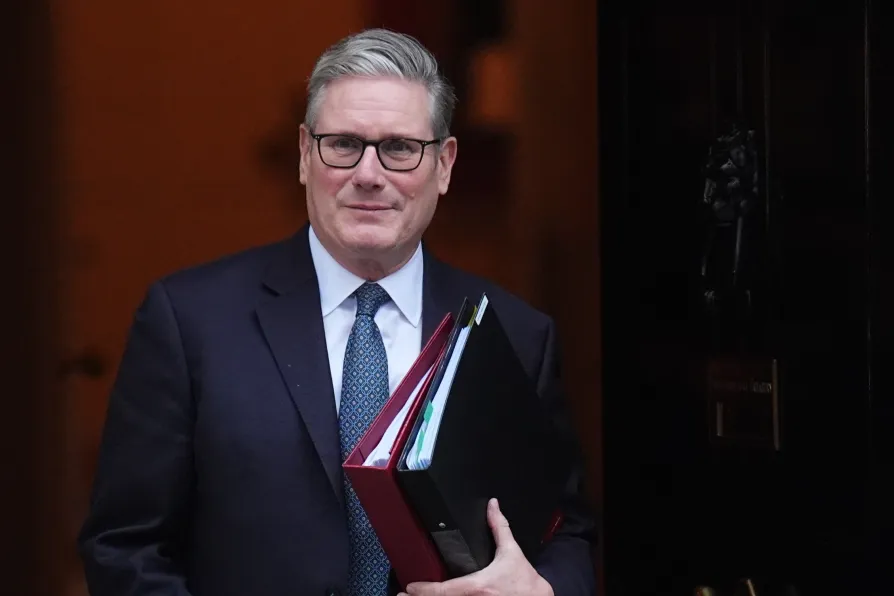Starmer defends budget as unions accuse Labour of ‘continuing of austerity’

 Prime Minister Keir Starmer departs 10 Downing Street, London, to attend Prime Minister's Questions and the Budget in the Houses of Commons, November 26, 2025
Prime Minister Keir Starmer departs 10 Downing Street, London, to attend Prime Minister's Questions and the Budget in the Houses of Commons, November 26, 2025
PM SIR Keir Starmer defended his government’s tax-raising Budget today despite official predictions of a “truly dismal” impact on household spending power.
The Office for Budget Responsibility’s (OBR) analysis of the tax and spending plans predicted 0.5 per cent annual growth in average disposable income over the next five years.
“This is truly dismal,” said Institute for Fiscal Studies think tank director Helen Miller.
“Especially when compared to the more than 2 per cent per year we achieved across every parliament from the mid-1980s to mid-2000s.”
Chancellor Rachel Reeves put Britain on course for a record tax take as she hiked levies by £26 billion on Wednesday.
Weaker economic forecasts had left holes in her previous spending plans.
Today, Sir Keir insisted that the autumn Budget “asked everybody to make a contribution” in order to protect public services and help people struggling with the cost of living.
He argued that his government had “done it in a fair way,” adding that he was “not going to apologise” for taking 450,000 children out of poverty — a reference to lifting the two-child benefit cap, which he had previously suspended MPs from Labour for demanding.
“I’m proud to be the Prime Minister who has done more on child poverty than any prime minister ever,” he bragged about the U-turn.
Sir Keir belatedly pointed to the “massive impact” the “abhorrent” Tory policy had had on the health of hundreds of thousands of children.
Unions have welcomed the measure but accused Labour of a “continuation of austerity” for imposing a manifesto-breaking stealth tax on workers instead of the super-rich.
Ms Reeves continued to face accusations today of breaching Labour’s election promise not to raise taxes on working people after deciding to keep tax thresholds frozen until 2030/31 and levying National Insurance on some pension contributions.
The freeze in thresholds will result in 780,000 more basic-rate, 920,000 more higher-rate, and 4,000 more additional-rate income tax payers in 2029/30 as earnings rise over time.
People are dragged into paying 20 per cent income tax on earnings above £12,570, 40 per cent from £50,271 and 45 per cent from £125,140.
Amid repeated questions over whether Labour’s manifesto pledge not to raise income tax, National Insurance or VAT on working people had been breached, Sir Keir said: “Anybody would acknowledge that in the last 12 months there have been a number of headwinds which weren’t expected.”
Communist Party general secretary Robert Griffiths said: “Desperate to appease Britain’s super-wealthy capitalist class and the bond markets, Chancellor Reeves has missed a historic opportunity to invest in public services, productive industry, low-cost green energy — and to launch a war on poverty.
“More importantly, there is no Alternative Economic Strategy to build millions of council houses and flats, harness the enormous potential of solar and tidal power and create more than a million well-paid jobs backed by well-funded training programmes for young workers.
“Instead, the OBR is now downgrading its UK economic growth forecasts for the next four years.
“Nor do modest tax increases on income from wealth and property begin to reduce gross inequality across Britain and fund extra public spending without more costly borrowing charges.
“Instead of freezing personal tax thresholds until 2031, costing working people more than £35bn a year, the Chancellor could have raised corporation and windfall taxes on big business profits and the top rates of income and council tax.
“A 1 per cent wealth tax on the richest one-tenth of the population would yield more than £55bn. Taxing the funds stashed illicitly by UK citizens in overseas tax havens — many of them under British jurisdiction — would raise another £65bn.
“And a 0.1 per cent levy on financial speculation in the City of London’s foreign currency and derivatives markets would wipe out the public-sector fiscal deficit in less than a week!”














